[ad_1]
Based on the number of local L.A. content creators that have visited Tian Xiang — a small, nondescript herbal medicine shop in Los Angeles’ Chinatown — you might think it’s the single best Chinese pharmacy in Los Angeles. Its TikTok star, in particular, is rising. You can find more than two dozen videos on the platform of customers touring the business and documenting their alternative healthcare journeys.
One TikTok user, who goes by mooneyegoddess, traveled 2½ hours by train to L.A.’s Union Station in May, then walked several blocks to Chinatown to see the herbal doctor at Tian Xiang. Why?
“After being frustrated with modern doctors not listening to me when I go in, I decided to go to what my spirit connected best with, an herbal doctor,” the caption for her video read.
“And I’m telling you guys, I feel amazing!” she raved in the video.
Another customer gushed over the customization of the herbal prescriptions.
“Oh, you can’t find this in the store, uh-uh, not this, baby!” the user actressamira voiced over a TikTok video of raw herbs being sorted.
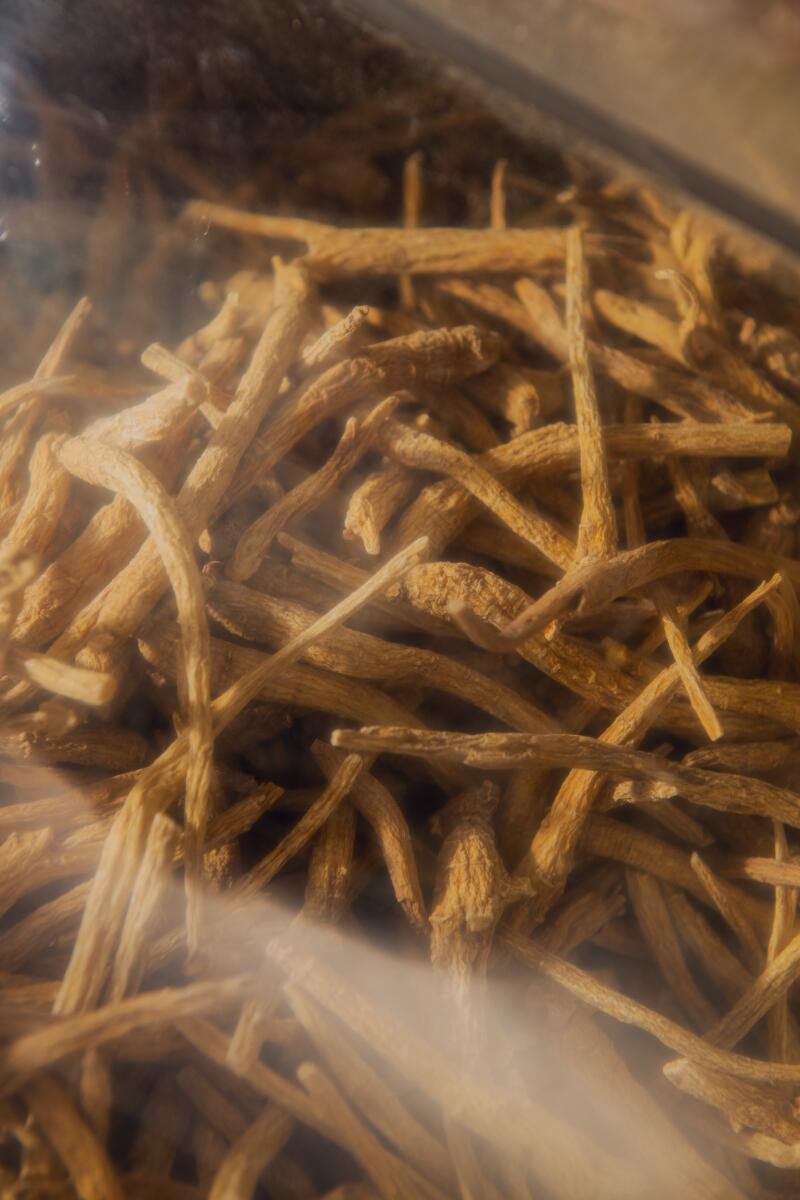
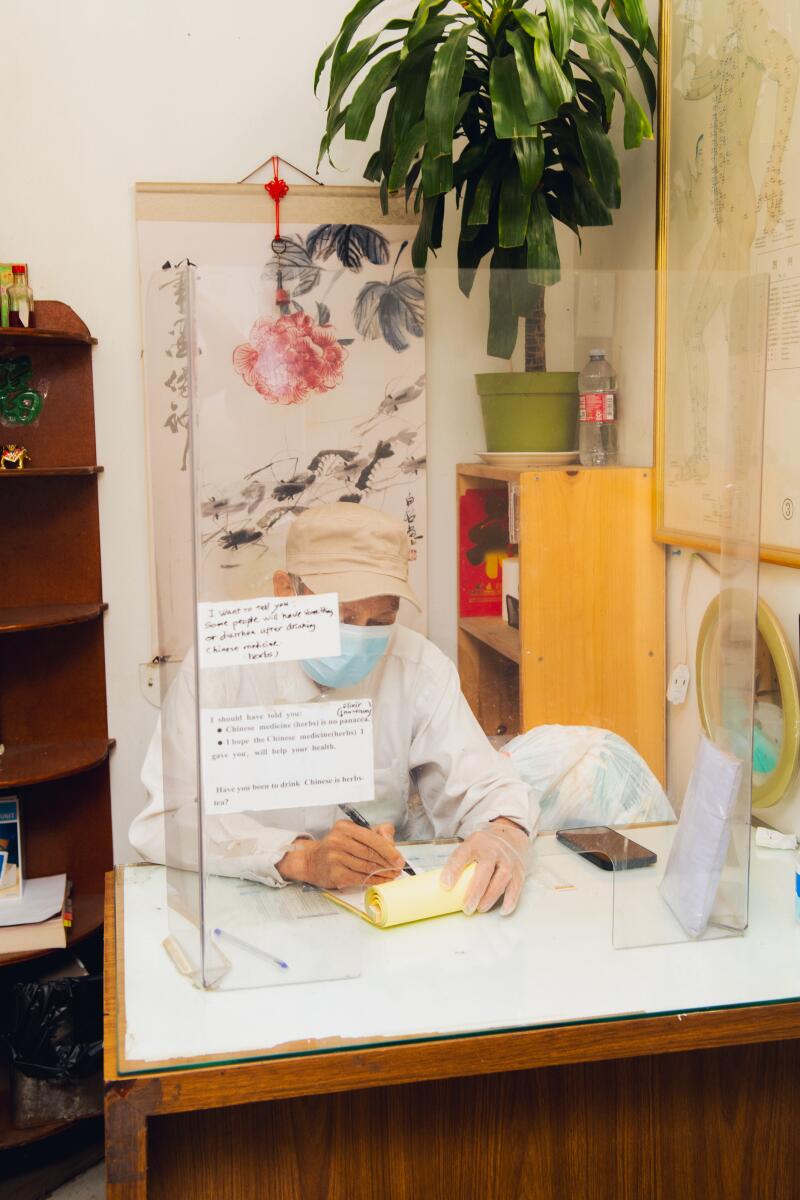
Huang at his desk inside the clinic.
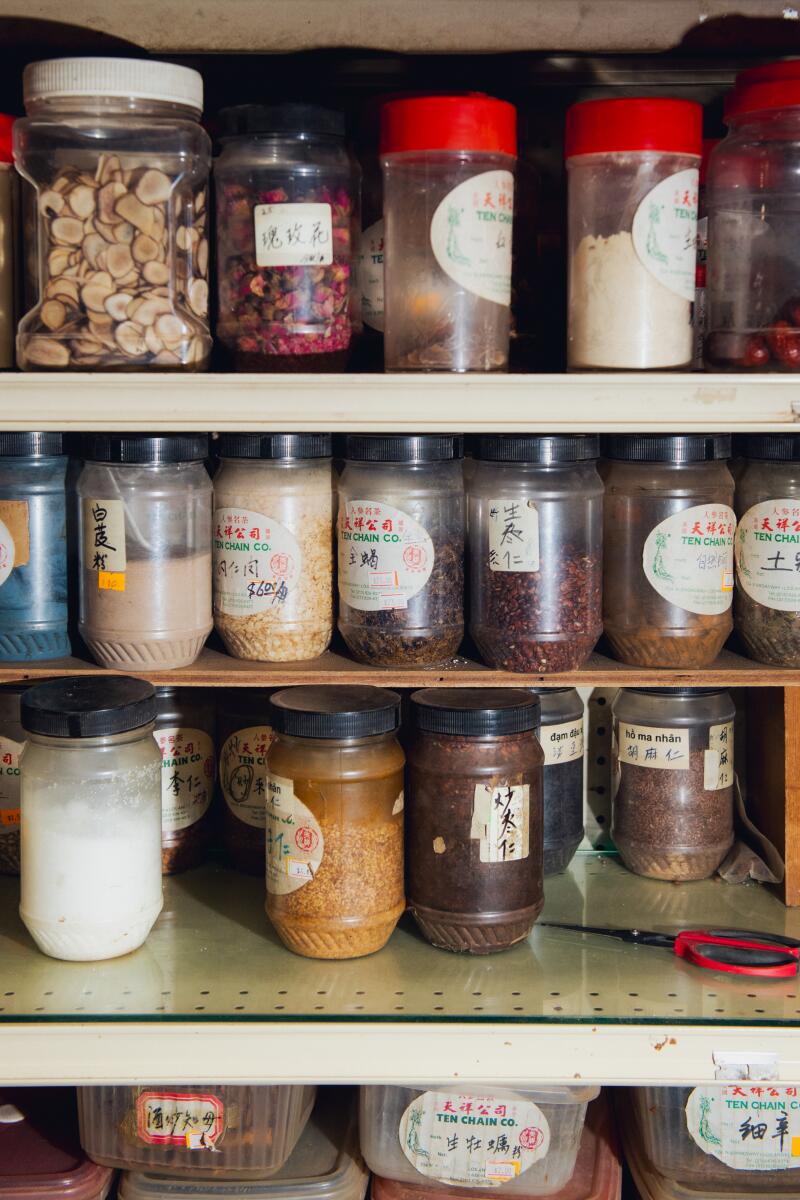
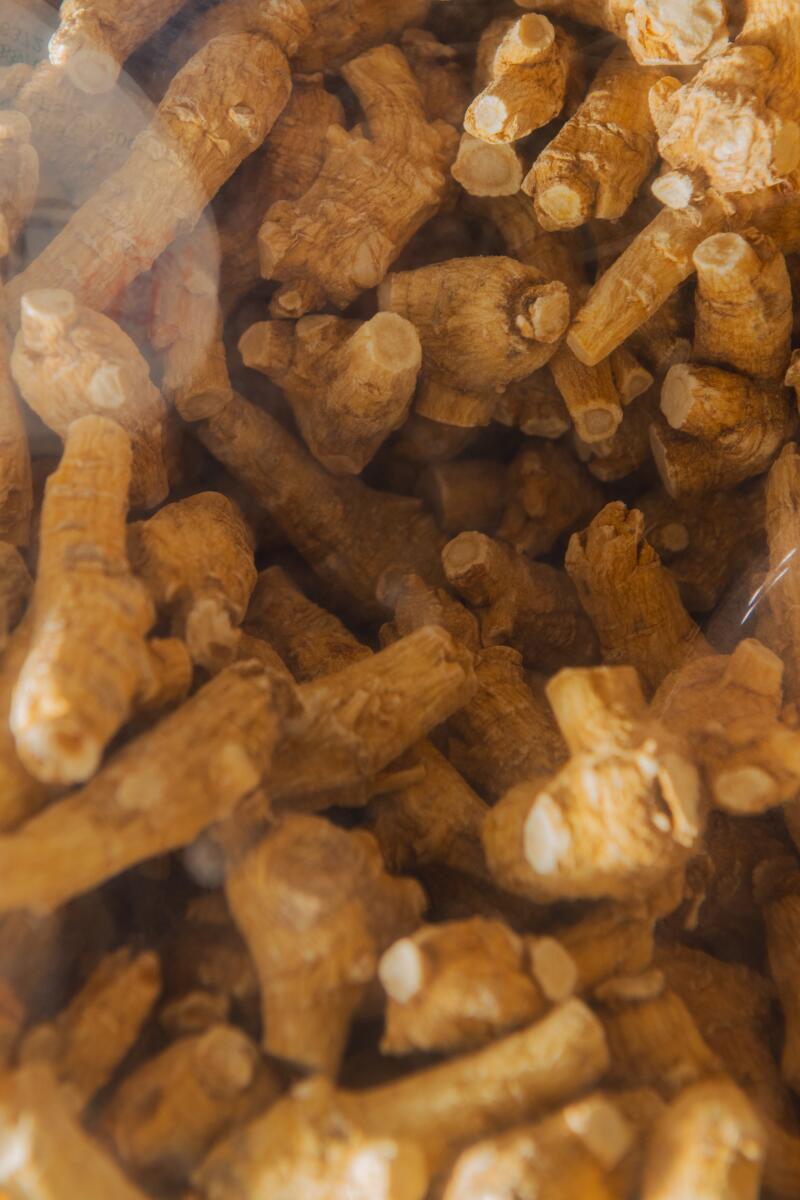
From top, left: Dry herbs, roots, and spices inside Tian Xiang.
The appeal is clear. Tian Xiang’s shelves are packed with dried herbs, roots and flowers that make a prism of colors and textures. A wall of wooden drawers stores loose herbs; bulk bins contain varieties of ginseng, goji berries and medicinal spices such as cinnamon and dried turmeric; a display behind the checkout counter showcases bottles of pre-made herbal supplements for nearly every imaginable condition: digestive issues, allergies, immune support, menopause, liver, heart and lung function among them.
What sets the store apart from other retail outlets, though, is the tiny clinic, jammed in a back corner beside a stack of unpacked boxes, barely larger than a walk-in closet. There, a man who goes by Dr. Huang — wearing a plastic surgical glove and medical mask — sits at a small desk behind a protective divider. (He did not go to medical school but has practiced traditional Chinese medicine, he says, for more than 50 years.)
There’s no weeks-long wait to see him, as is so often the case with, say, the U.S. healthcare system. Customers simply drop by, sans appointment, and pay $15 for a few minutes for Huang to assess their condition and prescribe them a customized, herbal remedy. It runs, on average, about $80-$95 for 10 days of daily use. The pharmacy will mix the herbs right there and send customers home with directions for how to prepare the loose tea.
There are more than 50 Chinese herbal apothecaries in the Los Angeles area, according to Willie So, sales director of Chinatown-based Solstice Medicine, a leading distributor of traditional Chinese medicine products since 1979. (He said Solstice Medicine has been providing inventory to Tian Xiang since the store opened.) And while Tian Xiang is a well-stocked and conveniently located one, its social media success is a mystery — even to the people who work there.
David He, the store’s manager, says Tian Xiang began seeing an uptick in business in 2020, at the start of the COVID pandemic, that has become amplified on social media over the last two years.
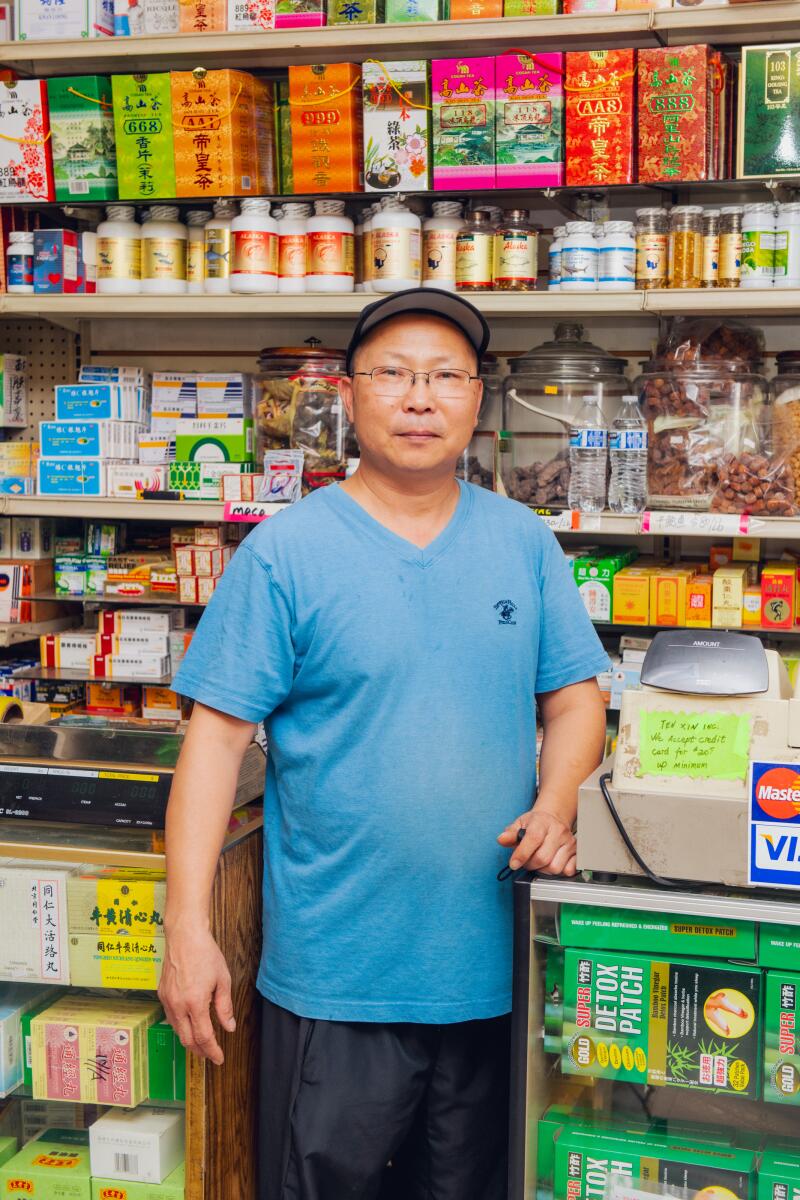
Store Manager, David He.
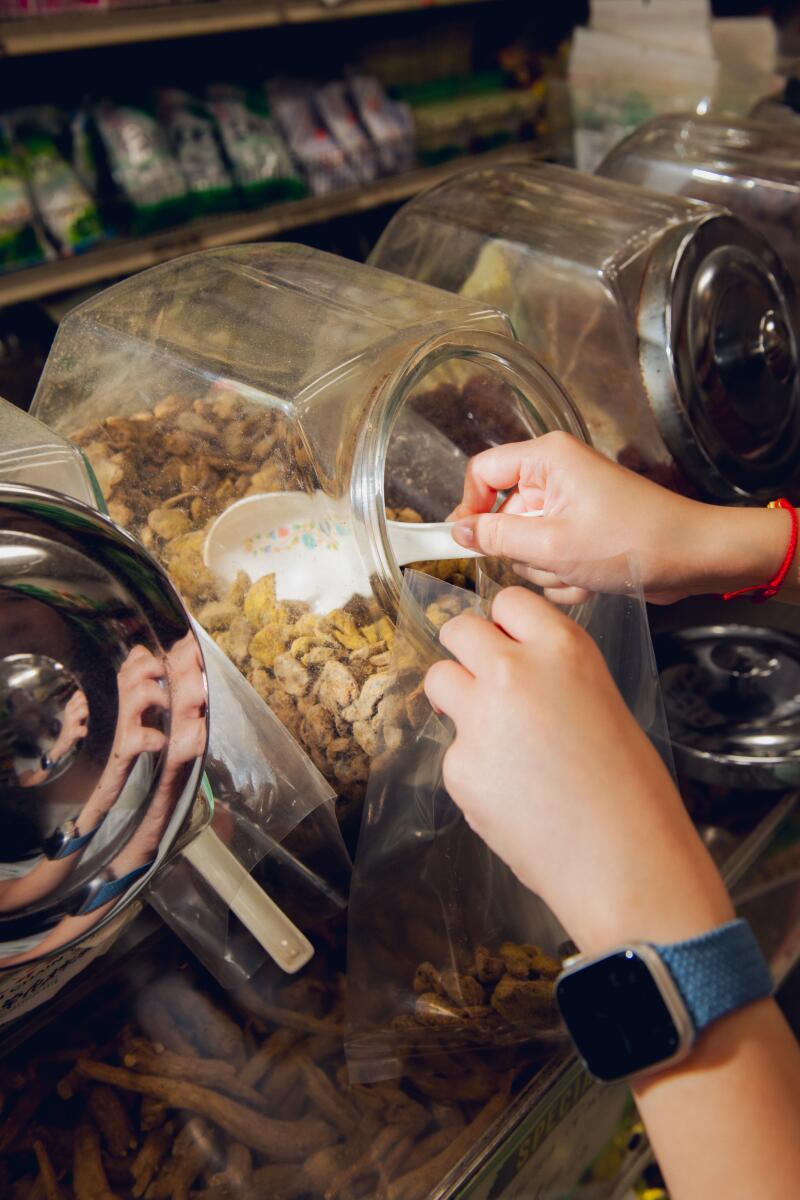
A container of dried fruit at Tian Xiang.
“Many Asian people from China and Cambodia and Vietnam came to get medicine for COVID because they believe more in traditional herbs to boost the immune system,” he said through a translator. “And at that time there was no vaccine. The customers felt good, and they posted about it, and then more people started coming. So it’s word of mouth.”
The type of wellness that Tian Xiang was peddling at the time was ripe for TikTok, says Freddy Tran Nager, a digital media professor at USC.
“A lot of alternative wellness trends do exceptionally well on social media, especially since the pandemic, as people look for new ways to be healthy,” he says. “And Asian culture, in particular, has been gaining more popularity online, whether that’s boba drinks or K-pop music — and Asian wellness goes along with it.”
That Tian Xiang is situated on Broadway, a main thoroughfare in Chinatown, didn’t hurt, he adds.
I was intrigued and decided to check out Tian Xiang for myself. I’m currently nursing a gym injury and open to anything that might help ease the pain in my neck and shoulder.
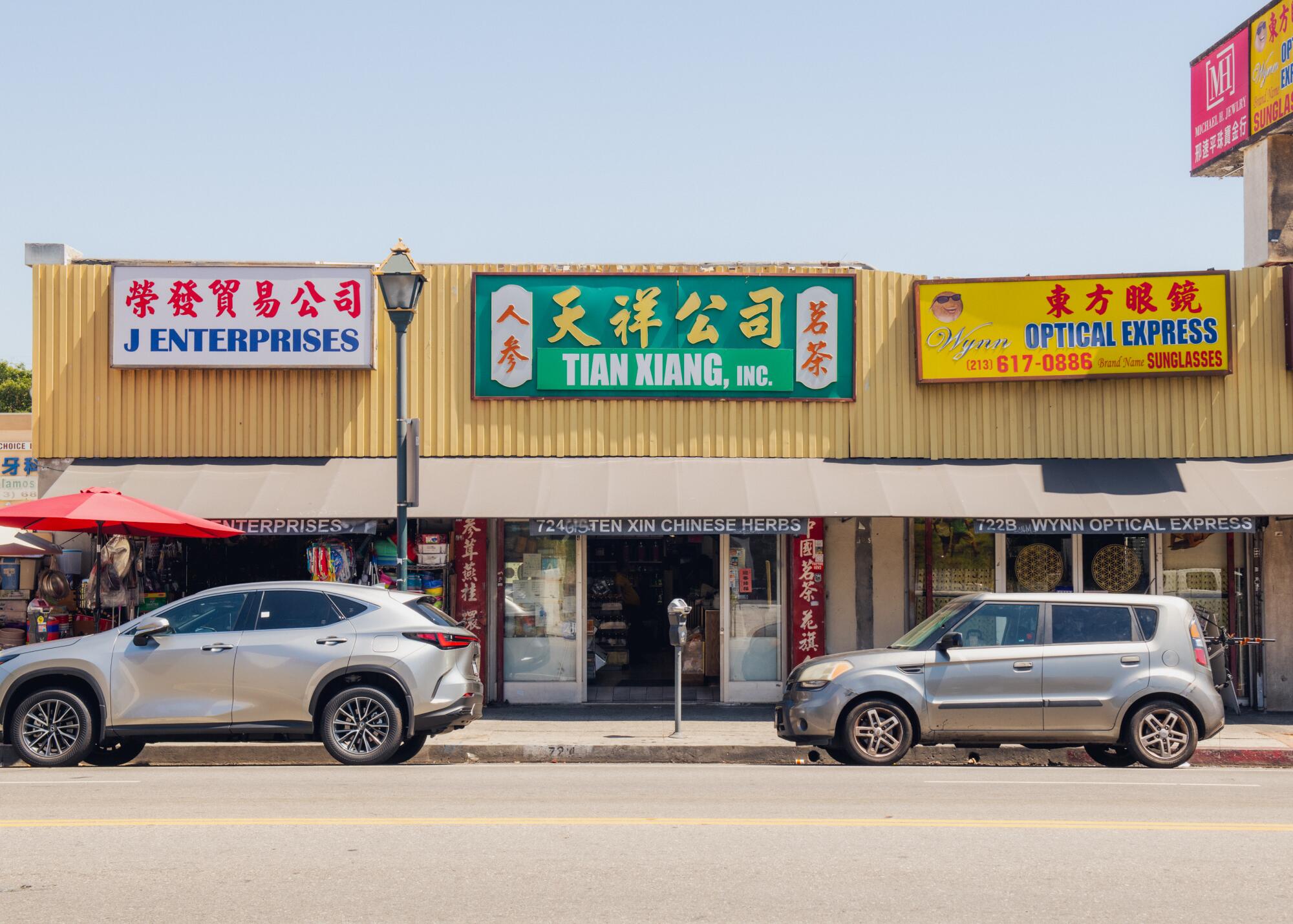
Tian Xiang’s location on Broadway, a main thoroughfare in Chinatown, provides it visibility to the curious wellness seeker.
Tian Xiang has been in the neighborhood for more than 40 years, though it has changed ownership multiple times. It’s a lively place, with a steady stream of customers — “mostly older, mostly repeat visitors and mostly Asian and Hispanic,” He says. They come regularly to treat everything from colds and the flu to infertility and back pain. The late-August afternoon I visited, I saw customers perusing the aisles and consulting with He, who frequently steps out from behind the counter, rubbing his belly or tapping his chest to demonstrate how the herbs might aid their ailments.
Nearby, two employees prepared a prescription for a customer, moving with assembly line-like efficiency in a precise but fluid dance: one ground herbs with a mortar and pestle while the other measured slabs of marbled ginseng on a traditional handheld gram scale. They alternately layered scoops of one ingredient or a sprinkle of another onto pieces of pink paper laid out on the counter top. Side by side, the piles of mixed herbs were like still-life paintings, each sparking with texture. Finally, a third employee packaged the herbs, sealing them in plastic bags.
“The doctor’s ready for you,” He told me, interrupting the mesmerizing show.
Our consultation was quick and to-the-point. Huang had me fill out my name and age on a small sheet of paper. Then he took my pulse. As he cradled my wrist, his forehead wrinkled in concentration. Then he tapped the keyboard on his phone for several minutes, writing into the Google Translate app, before pushing the phone toward me: “Poor blood circulation, weak spleen and stomach, disordered hormones, and a bit,” read the screen.
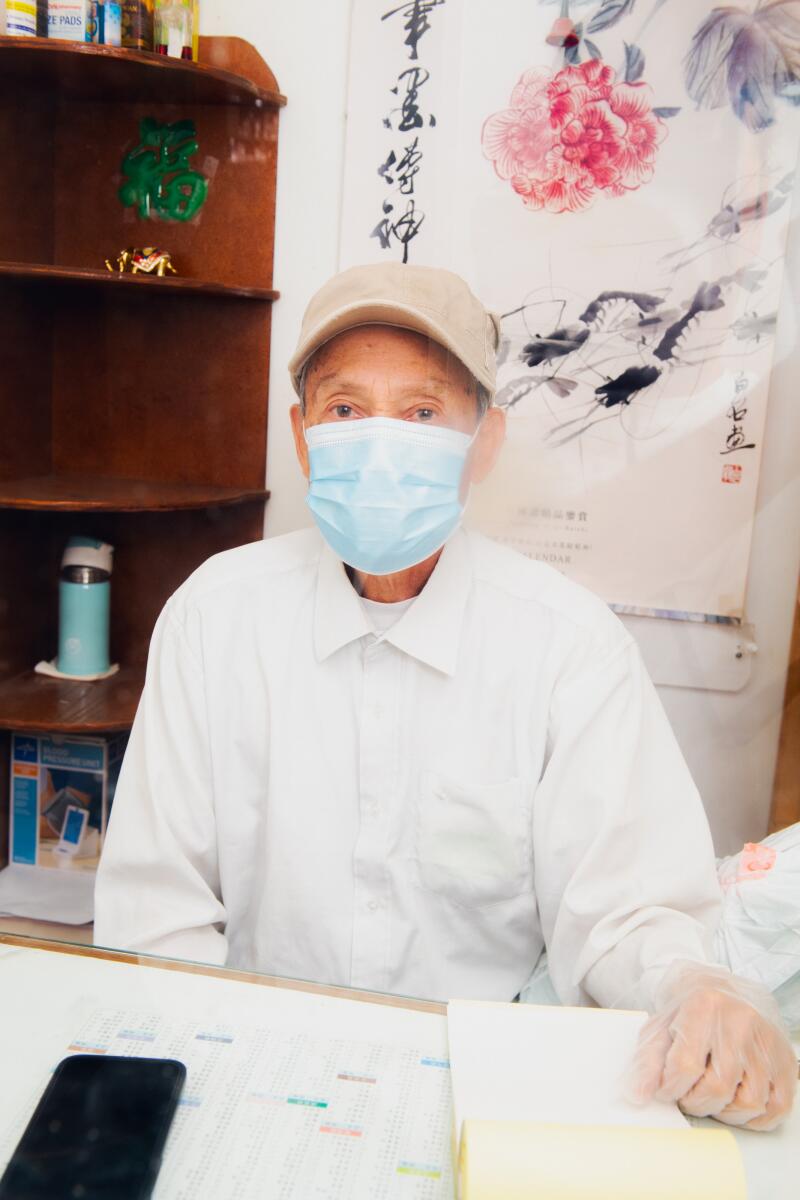
Huang inside the clinic.
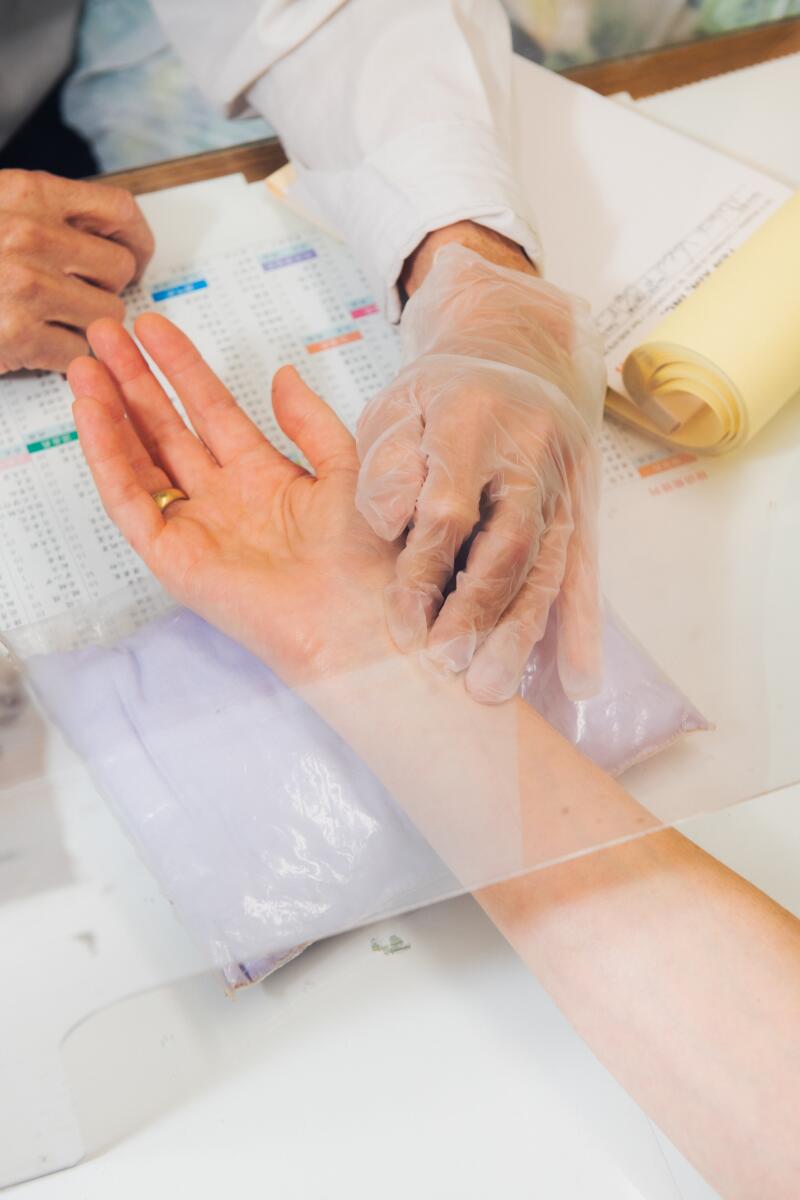
Huang takes reporter Deborah Vankin’s pulse.
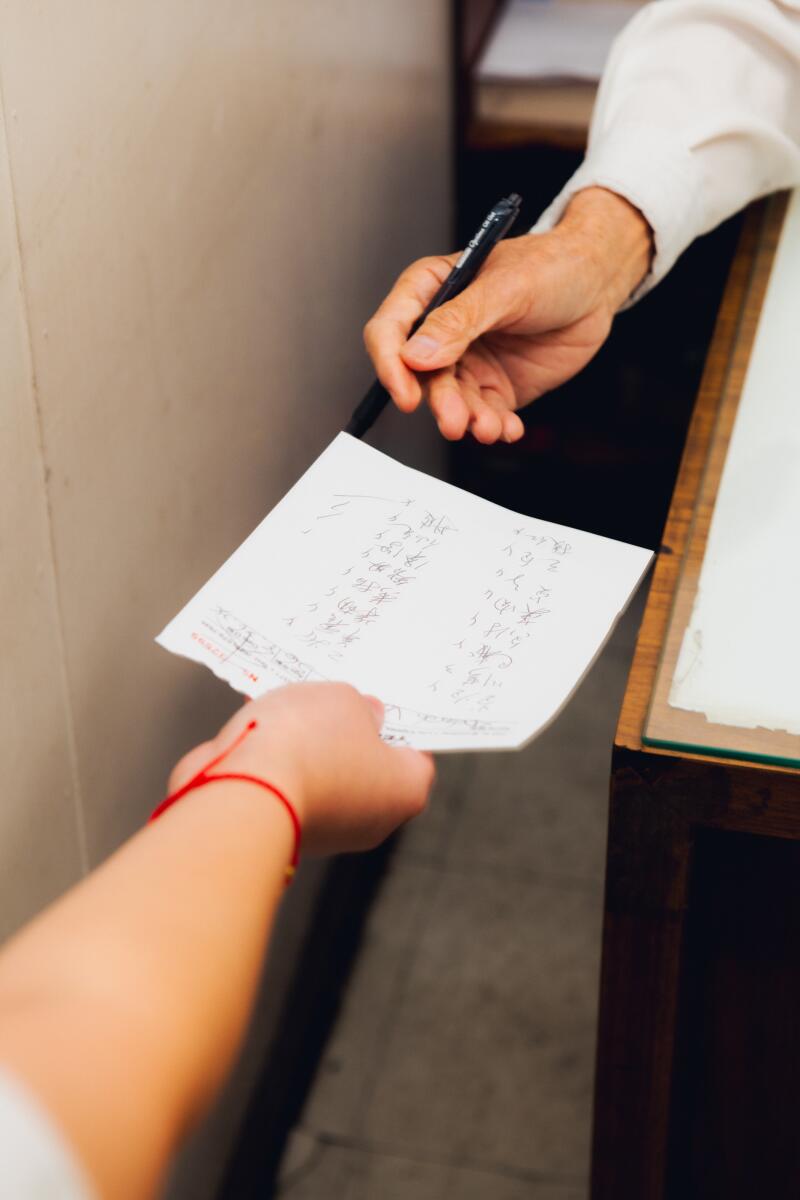
Huang hands over his prescription.
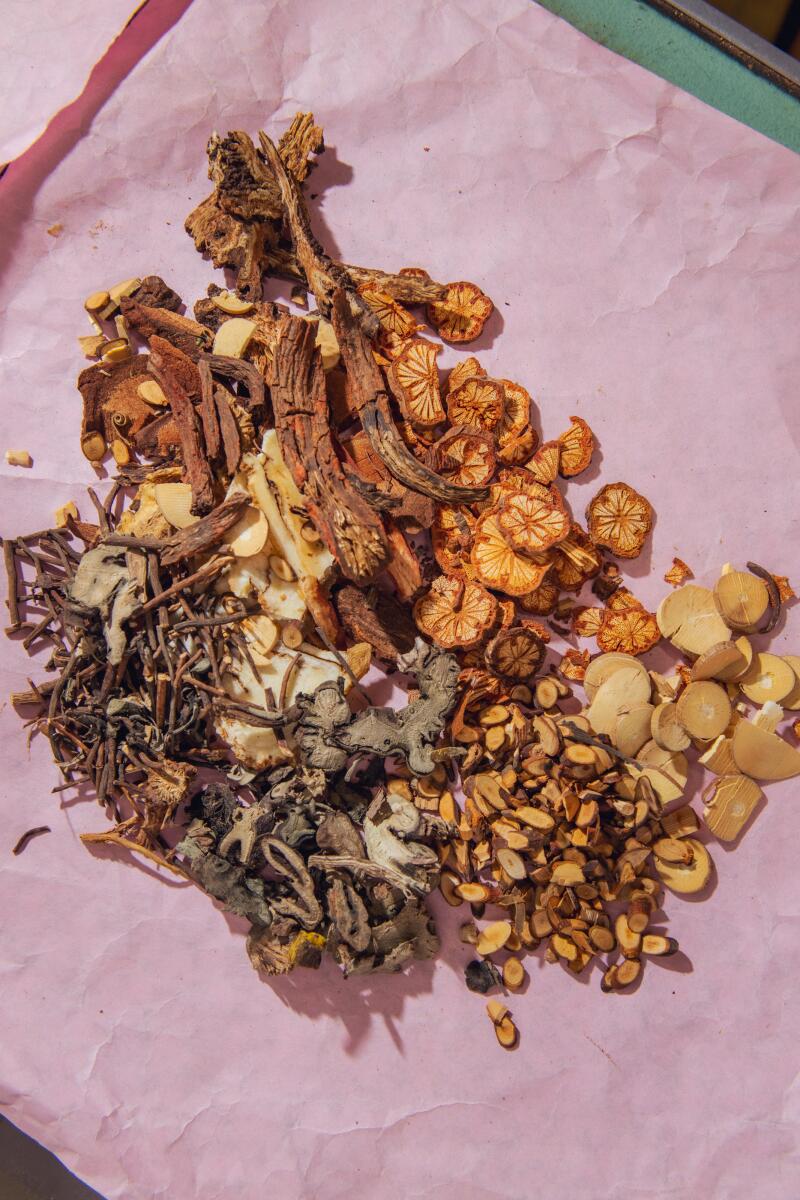
Dry herbs, roots, and spices for Deborah Vankin’s customized medicinal tea.
How did he know all this without examining me? He didn’t even look at my tongue, which is typical of a traditional Chinese medicine, or TCM, “tongue and pulse consultation,” I learned from a doctor at UCLA’s Center for East-West Medicine, while researching this piece.
“Experience,” he says through a translator. Huang has been working at Tian Xiang for more than 20 years. Before that, he practiced traditional Chinese medicine for 30 years in the city of Taishan in the Guangdong province of China. He’s a third-generation TCM doctor.
My neck stiffness, he says, is from poor blood circulation — he can tell that by listening to the rhythm and patterns of my pulse on each wrist, not just the number of beats per minute.
Herbal remedies in traditional Chinese medicine have been around for thousands of years, though their efficacy is debatable. Some, such as Dr. KaKit Hui, director of UCLA’s Center for East-West Medicine, say the right combination of herbs for the appropriate ailment can “save lives,” though he stresses the importance of practitioners being properly educated.
“Many conditions — coughing and upper respiratory infections or GI problems — can be helped,” Hui says. “They use herbs for lupus and cancer in China. But you don’t want to use herbs to replace necessary medications or [receive treatment] from someone who doesn’t know what can be mixed with what — herbs can interact with medications — you need someone who knows how to monitor it.”
Others, such as Dr. Craig Hopp of the National Institutes of Health’s National Center for Complementary and Integrative Health, which researches medical approaches outside the Western mainstream, note that Chinese herbs, like supplements, are not FDA regulated and there can be concerns about the purity of the plants and their provenance.
“It can sometimes get a little murky as to where [the herbs] come from,” Hopp says. “Lots of plants look alike and are called similar things, so the taxonomy and the nomenclature can be confusing. Unless you have a very well-trained botanist who knows what they’re looking for, you could be getting something else by the time it gets to an apothecary.”
My prescription — which came in three large plastic bags for six days worth of tea — was $63. It included 16 ingredients, Indian mulberry, golden eye-grass, the deciduous perennial Asian lizard’s tail and the carrot-like plant Szechuan Lovage among them.
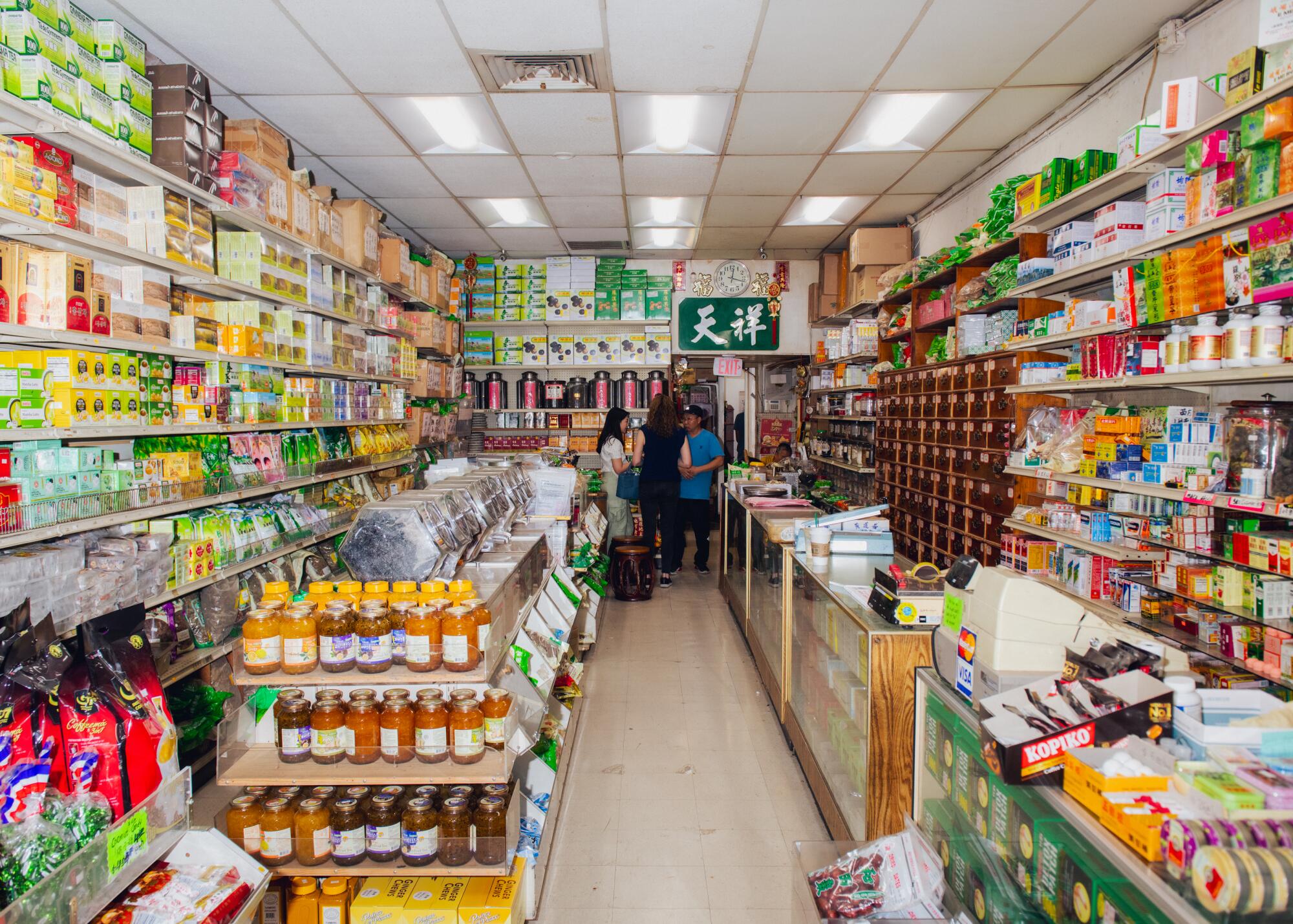
The interior of Tian Xiang, a Chinese herbal remedy shop.
He wouldn’t say where, exactly, the herbs come from, just that the store gets them from distributors in Monterey Park and Alhambra, who source them mostly from China, with some coming from Korea, Vietnam and Japan. He did say the herbs are “high quality.”
“My father, he’s 80 and he just had gallbladder surgery and the herbs seem to help,” one customer, Dericia Witalina, said while awaiting herbs her dad was prescribed. Her family lives in the San Fernando Valley and despite the drive, “if we need something, we come here,” she said.
Most, however, visit because it makes them feel healthier, He says.
“Many customers come here not to kill this germ or kill this virus, but it’s more about boosting the general body function.”
No matter how much better TikTok users claim to sleep or feel after drinking their prescribed herbal tea, the consensus on its taste seems to be less enthusiastic. One patron, who goes by 123aram5 on TikTok, summed up their review in two words: “Uh-uh — nope!” Others complained about the woodsy, pungent flavor.
I proceeded with caution, simmering the herbs for about an hour, per the store’s instructions, until they were mushy and the tea was a deep, murky brown. My home smelled like a forest after the rain, which was actually kind of pleasant and soothing.
The taste, however, was rank, nearly impossible to get down. I made a note to next time use a dollop of the honey and yuzu mixture, sold at the store. If there would be a next time.
That night I slept especially deeply. Was it the herbs? A placebo effect? The hot yoga I’d done earlier? Who’s to say. But I’ll take whatever I can get.
Grace Xue contributed reporting for this article, including translating interviews.
[ad_2]
Source link